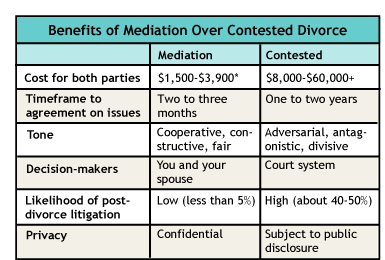Contact Me Today
Divorce Mediation in Commack, New York
Mediation is a less painful and costly alternative to traditional divorce. While not necessarily suitable for everyone, mediation can greatly reduce the stress, frustration, and pain that typically occur during divorce.
How Is Mediation Different from Traditional Divorce?
There are two types of divorce: contested and uncontested. The majority of couples end their marriage through, uncontested divorce. This means that each spouse is able to agree on issues like maintenance (formerly alimony), child support, and division of property and assets. The process is relatively quick and affordable.
However, if a couple disagrees on the terms of spousal support, child support, or the division of property or assets, the divorce process can become litigated, and costly, and a contested divorce can last weeks or months.
Maintain Your Authority
Let Me Be Your MediatorDivorce mediation, on the other hand, takes place typically over one to three months over and is significantly cheaper than a contested divorce. Additionally, mediation is less hostile than divorce and focuses on resolving issues through a mutually beneficial agreement.
The process involves both parties and I act as a divorce mediator. As a mediator, my role is to be a third neutral party who motivates each spouse to stay on topic and focus on resolution. The goal is to identify conflicts and issues and work patiently to resolve them in a timely, yet cooperative manner.
It is important to realize that the number of sessions is dependent upon the number of issues that need to be addressed. Some mediation issues may be resolved in one session, while others may take several sessions. Upon the completion of each session, the divorce mediator prepares a memorandum that details the issues resolved at the previous session and outlines new issues to be addressed at the next session.
Law Office of Joel R Salinger, P.C. can assist in resolving all divorce-related issues through mediation including:
Equitable distribution of marital assets & liabilities.
Child custody & child support.
Visitation.
Maintenance / Alimony.
Federal & State Taxes.
Business Interests.
Estate Planning.
Retirement Accounts / QDROs.


